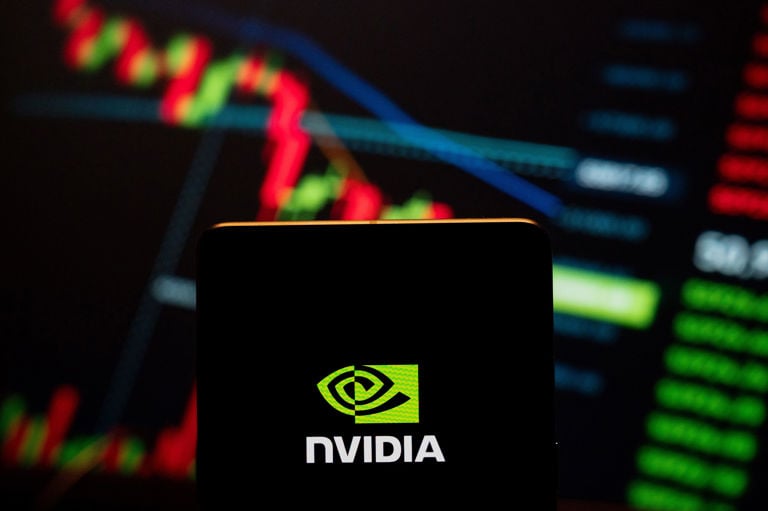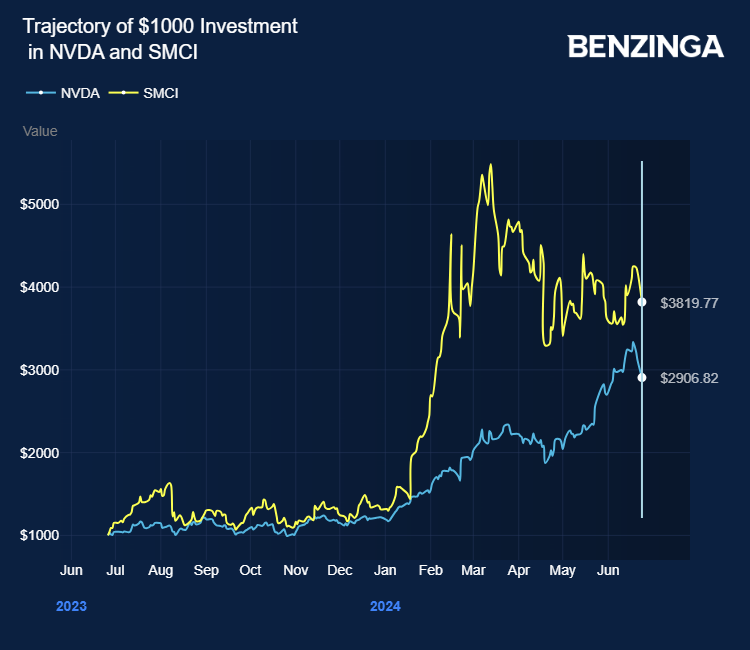Nvidia’s stock has experienced a sharp decline over three trading days. This drop comes after a meteoric rise of 174% this year. The sudden fall has reignited fears of a potential market bubble.
Economist Harry Dent has drawn parallels to the dotcom bubble of the late 1990s. Nvidia’s market cap has shrunk by 13% to $294.8 billion as a result of this downturn.
Echoes of the Dotcom Bubble Era

The current situation reminds many of the dotcom bubble from 1995 to 2000. During that period, excessive speculation in internet-related companies led to a market crash. The NASDAQ Composite index rose 400% between 1995 and 2000, then fell 78% from its peak by October 2002.
Like then, today’s market is seeing rapid growth in specific tech companies. This pattern of boom and bust in tech sectors has raised concerns among economists and investors.
Harry Dent Warns of Potential Crash

Economist Harry Dent has issued a stark warning about the current market conditions. He believes we’re in a “bubble of all bubbles” that has been inflating for 14 years. Dent predicts a potential 98% crash in the US stock market if this bubble bursts.
He argues that the extended duration of this bubble could lead to a more severe crash than the 2008 financial crisis. Dent’s predictions, while extreme, highlight the growing concerns about market stability.
Nvidia’s Remarkable Rise in AI Boom

Nvidia’s stock price has surged about 150% this year, largely due to the AI boom. The company’s Q1 earnings announcement triggered a further 30% increase in the past month. On June 18th, Nvidia’s market cap briefly touched $3 trillion, making it the world’s most valuable company.
This rapid ascent reflects the market’s enthusiasm for AI-related technologies. However, the recent pullback suggests some investors are taking profits after the steep climb.
Market Adjustments or Start of Decline?

Experts are divided on whether Nvidia’s recent decline signifies a broader market shift. Some analysts view it as a temporary adjustment rather than a fundamental change. Bank of America has maintained its buy rating and $150 target price for Nvidia.
Investment bank Jefferies also remains bullish, raising its price target from $135 to $150. These positive outlooks suggest that many market experts still see potential in Nvidia despite the recent volatility.
AI’s Impact on Tech Stock Valuations

The artificial intelligence boom has significantly impacted tech stock valuations. Companies like Nvidia, which produce chips crucial for AI applications, have seen their stock prices soar.
The Global X Robotics & Artificial Intelligence ETF (BOTZ) has risen over 30% year-to-date in 2023. However, some analysts warn that AI-related stocks may be overvalued. The current situation draws comparisons to previous tech-driven market bubbles.
Nvidia’s Position in the AI Market

Nvidia has established itself as a leader in the AI chip market. The company’s graphics processing units (GPUs) are widely used in AI and machine learning applications. Nvidia’s data center revenue, which includes AI-related sales, grew 80% year-over-year in Q1 2023.
The company’s dominance in this sector has been a key driver of its stock price growth. However, competition is increasing as other chip makers develop AI-focused products.
Market Volatility and Investor Sentiment

The recent fluctuations in Nvidia’s stock price highlight the current market volatility. The CBOE Volatility Index (VIX), often called the “fear index,” has seen increased activity. Investor sentiment appears mixed, with some taking profits while others remain bullish on tech stocks.
The situation underscores the challenges investors face in navigating rapidly changing market conditions. It also reflects broader uncertainties about the sustainability of the current tech-driven bull market.
Regulatory Concerns in the Tech Sector

As tech companies like Nvidia grow more powerful, regulatory scrutiny is increasing. Antitrust concerns have been raised about the dominance of large tech firms. The European Union has proposed new regulations for AI, which could impact companies like Nvidia.
In the U.S., there are ongoing discussions about potential regulations for the AI industry. These regulatory considerations add another layer of uncertainty to the valuations of AI-focused companies.
Long-term Outlook for AI and Tech

Despite short-term volatility, many analysts remain optimistic about the long-term prospects of AI and related technologies. The global AI market is projected to grow from $387.45 billion in 2022 to $1,394.30 billion in 2029, according to Fortune Business Insights.
Companies like Nvidia are well-positioned to benefit from this growth. However, investors and analysts alike caution that the path forward may include significant market fluctuations. The challenge lies in distinguishing between short-term hype and long-term value in the rapidly evolving tech sector.


